Custom Home Builder | New York
I Want To Build A House On My Land, Where Do I Start?
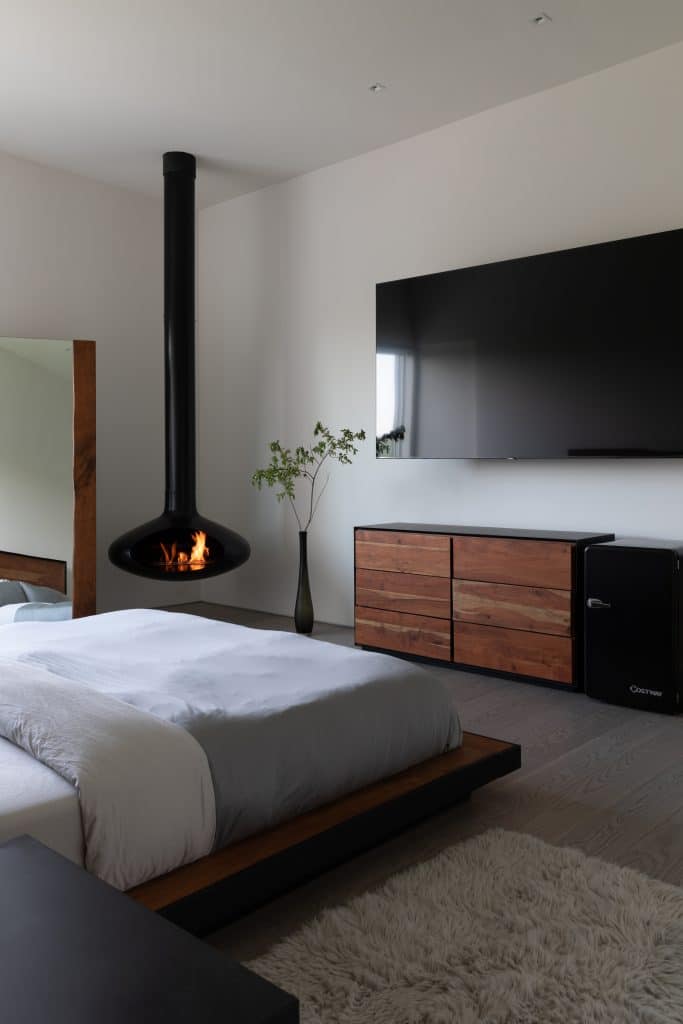
Building a house on your own land is an exciting endeavor, but it can also be overwhelming. From financial planning to understanding the construction process, there are many factors to consider. This guide will walk you through the essential steps to turn your vision into reality. For those looking to build in the Upper Hudson Valley, luxury custom home builders in New York, like RappCM, stand ready to build your dream home on your own land.
In this article:
- Is it Financially Smart to Build a House?
- Is it Cheaper to Buy Land and Then Build Your House on It?
- How to Finance Buying Land and Building a House?
- How Much Money Do You Need Upfront to Build a House?
- How Much Money Should You Have Before Building a House?
- Should I Pay Off My Land Before Building?
- How Long Does It Take to Build a Home from the Ground Up?
- What Are the 5 Stages of Building a House?
Disclaimer** All cost data in this article is based on national or state-wide data; the real cost can only be accurately estimated on a case-by-case basis by your selected home builder.
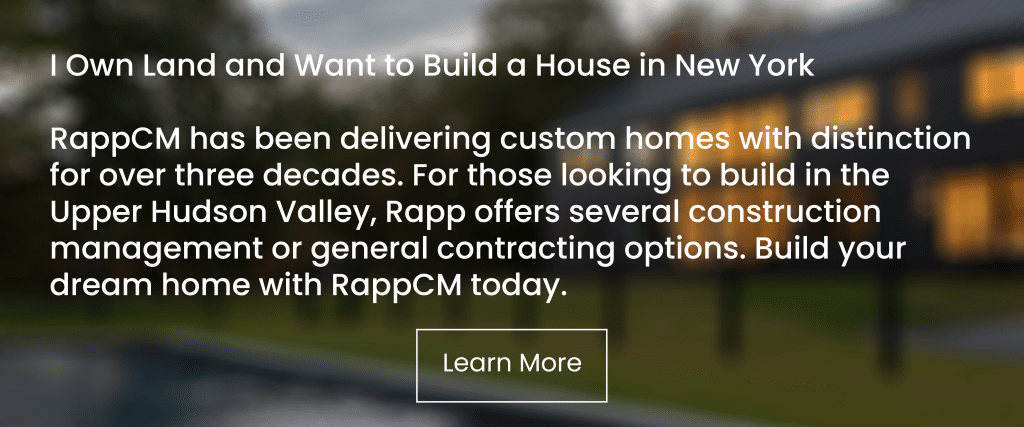
Is it Financially Smart to Build a House?
Building a house can be a financially sound decision, offering several advantages over buying an existing home. The custom nature of a new home allows you to design a house that meets your specific needs, increasing its long-term value. While the initial costs may be higher, newer homes retain their value better than older homes. Depending on location and building-specific details, building a new home will undoubtedly become an increasingly valued asset.
Building a new home can cut down on costly renovations, while having the perfect design from the outset. For example, older homes often require expensive updates to meet modern building codes and standards. By starting fresh, you can incorporate the latest technology and materials from the outset.
Built with modern lifestyles in mind, new homes also offer the opportunity for open floor plans, larger kitchens, and more storage space. These features are highly desirable and can enhance the functionality and enjoyment of your home. Full customization means you can design spaces that fit your personal needs and preferences perfectly.
For more detailed guidance on financial planning and the steps involved in building your custom home, check out our articles on “How to financially prepare to build a house?” or “How to build a house from the ground up?”.
Is it Cheaper to Buy Land and Then Build Your House on It?
According to HomeAdvisor, the cost of constructing a house is substantially lower than the median home sales price reported by HUD for 2023. Depending on your local real estate market, the cost to building a house, if you already own the land, can often be cheaper than buying existing real estate.
To find the best deals on land, it is crucial to conduct thorough research, particularly in less developed, yet still accessible, areas. For example, RappCM has delivered comprehensive construction management services to clients in the Hudson region, which offers significantly lower residential costs and is conveniently close to New York City. The cost to build a house if you already own the land in New York is significantly less upstate vs. in the city.
Ultimately, home builders take advantage of the latest materials and technologies, reducing the need for frequent maintenance and boosting the home’s energy efficiency. These features can lead to significant savings on utility bills and overall maintenance over time.
For more information on building a luxury home in Upstate New York, read our full article.
How to Finance Buying Land and Building a House?
When embarking on this journey, it’s essential to grasp the financial steps involved in constructing a home. This encompasses budgeting, exploring financing options, selecting a loan type, determining the down payment, and estimating building costs.
To start, establish your overall budget by factoring in both construction expenses and additional costs such as permits, design fees, and landscaping. There are various construction loans available to cater to different needs. Here are some common construction loan options for potential homeowners:
- VA loans, accessible to military members and veterans, and USDA loans, aimed at rural buyers, both offer 0% down payments.
- Conventional mortgages may require as little as 3% down.
- FHA loans necessitate a 3.5% down payment for credit scores of 580 and above, while scores between 500 and 579 require a 10% down payment.
- Jumbo loans are intended for larger amounts that surpass conforming loan limits and usually require 5-10% down.
Ultimately, there are numerous loan options for first-time homebuyers and experienced homeowners, alike. Explore the financial steps to building a house in our full article.
How Much Money Do You Need Upfront to Build a House?
According to the National Association of Realtors, the average down payment for first-time home buyers in 2023 was approximately 8%. Nevertheless, making a down payment exceeding 20% can be advantageous, as it helps bypass the expense of mortgage insurance. This could result in a monthly saving of roughly $30 to $70 for every $100,000 financed.
Building a home involves several upfront costs beyond the down payment. These include land acquisition, which can vary widely depending on the location, size, and desirability of the lot. Site preparation is another significant expense, covering tasks such as clearing the land, grading, and installing essential utilities like water, sewer, and electricity.
Architectural and engineering fees are also critical upfront costs. When building a fully bespoke home, these professionals ensure that the home is designed to meet your specifications and complies with local building codes. Additionally, obtaining the necessary permits and inspections from local authorities can incur considerable costs.
These additional building details can be managed by an experienced construction manager. RappCM guided clients from planning through to the final walkthrough. With several construction management options available to clients, Rapp builds your dream home on your terms.
For insights on the most cost-effective way to build a custom home, read our full article on construction management as agent.
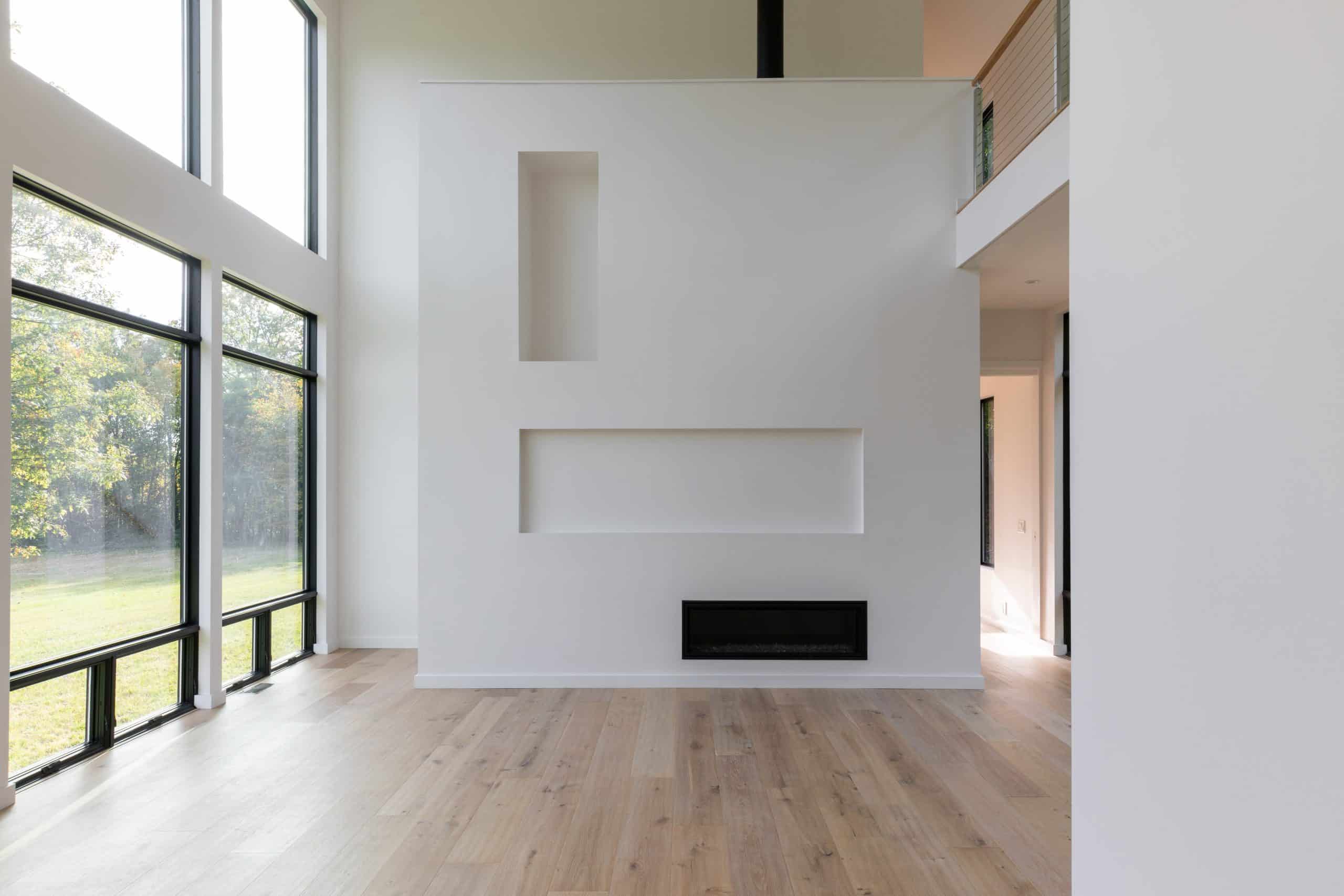

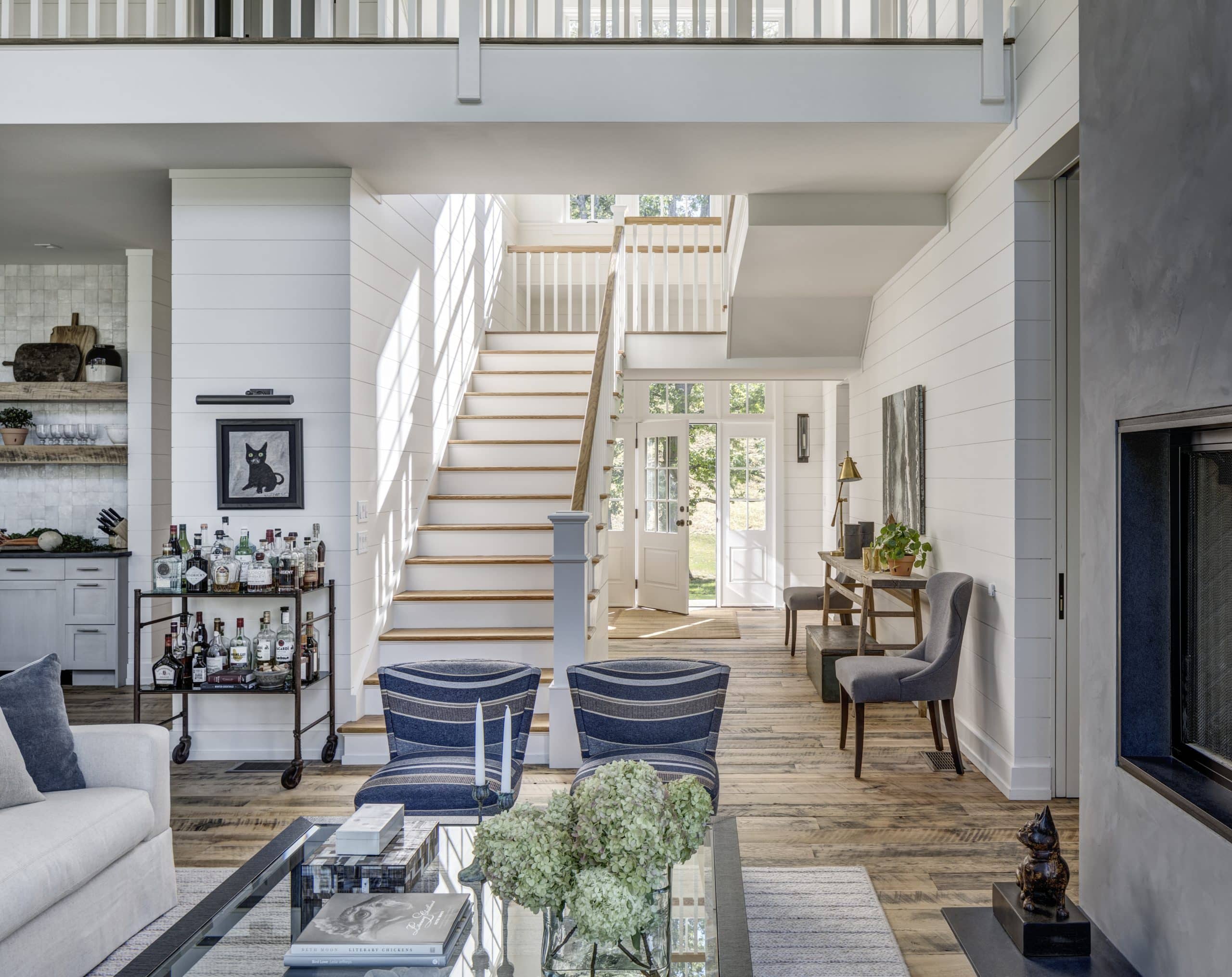
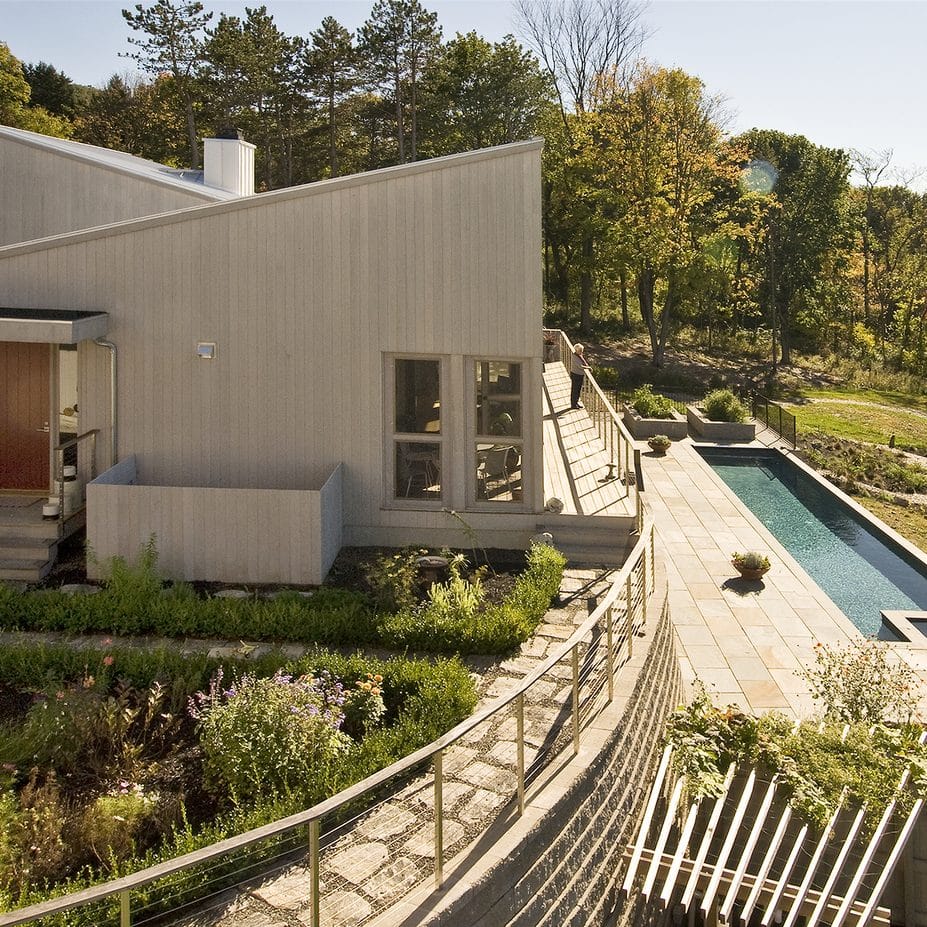

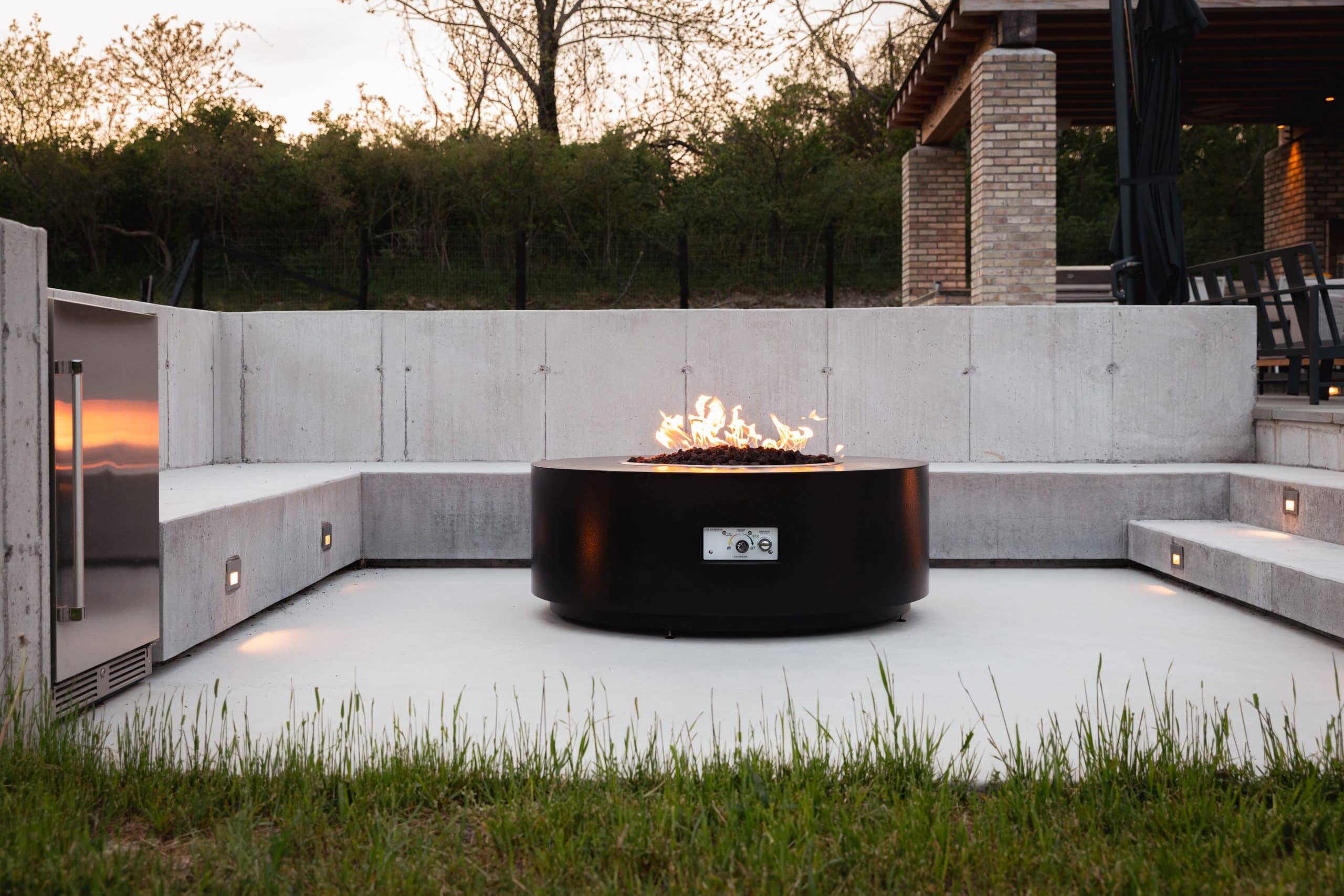
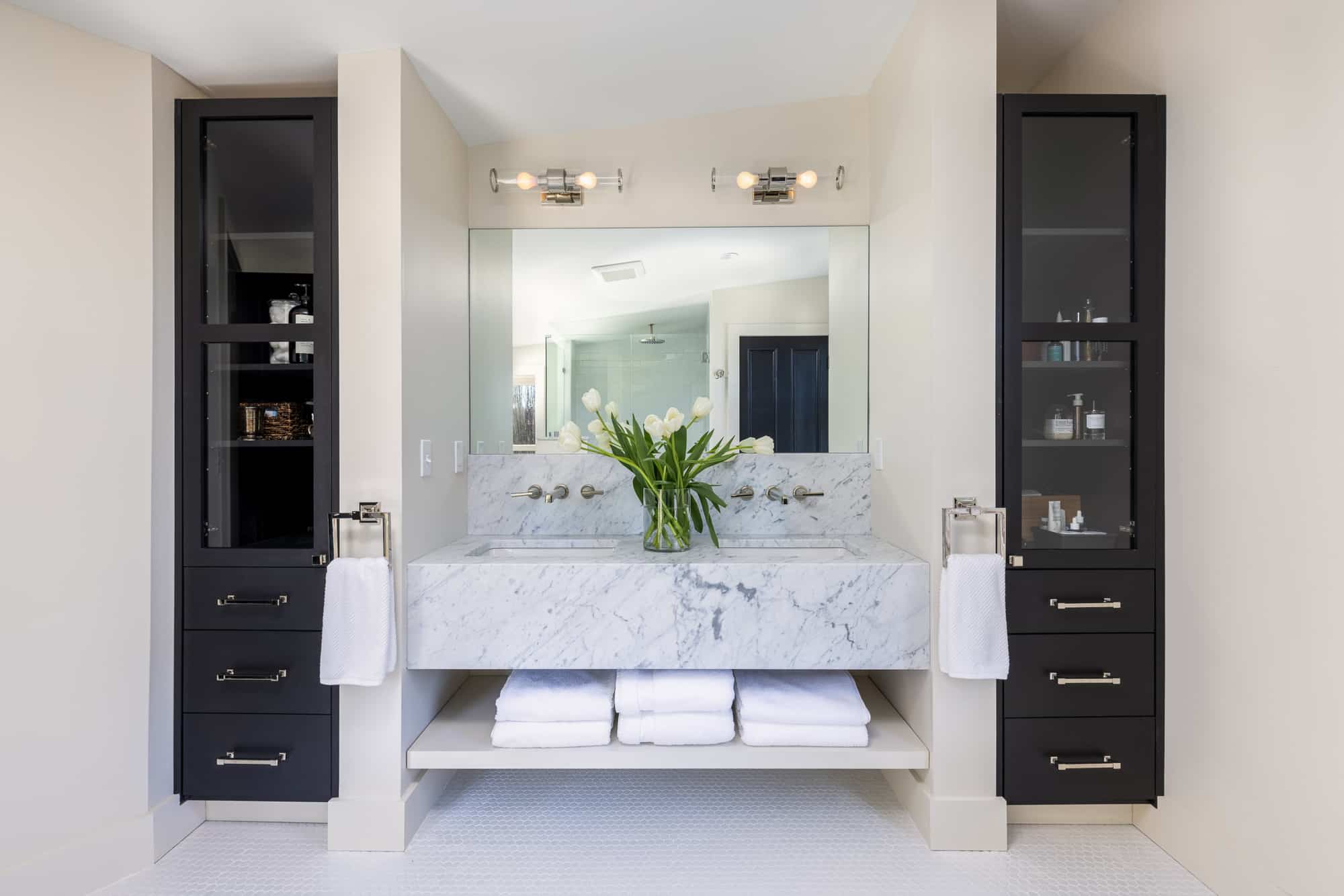
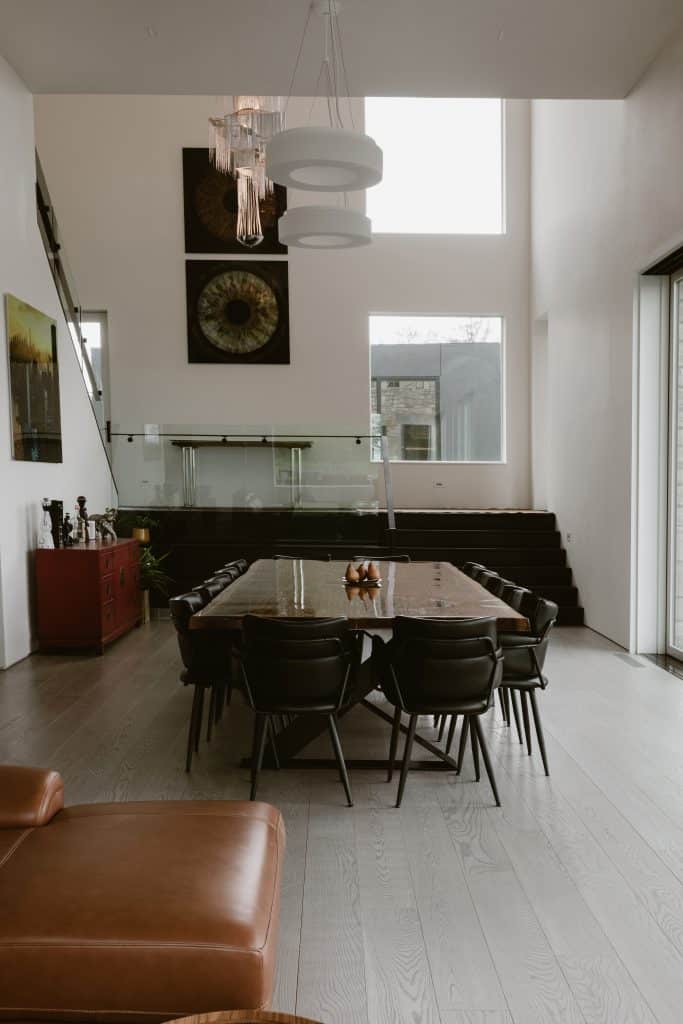
How Much Money Should You Have Before Building a House?
Taking land fees, clearing costs, and architectural fees into account, homeowners should have significantly more than the 8% average down payment. Furthermore, experts recommend setting aside a contingency fund amounting to 10-15% of your budget to address unforeseen costs.
This financial buffer guarantees that you can manage any surprises without jeopardizing your project. This reserve can cover unexpected expenses such as sudden price increases in materials, unforeseen complications during construction, or additional customization requests. Having this cushion ensures that your project remains on track and within budget, providing peace of mind throughout the building process.
For more information, read our article on “How to Financially Prepare to Build a House?“
Should I Pay Off My Land Before Building?
The choice to pay off your land before starting construction impacts your loan options, financial stability, and overall project feasibility. Here are some key considerations:
- Financial Position: Paying off the land can enhance your financial standing, making you a more attractive candidate for construction loans. It demonstrates stability and reduces debt, which may lead to better loan terms and interest rates.
- Using Land as Equity: If you own the land outright, you can use its value as equity for a construction loan. This can be advantageous as it leverages the land’s worth to secure the necessary funds for building. The land’s value, combined with your financial profile, will determine the loan amount and conditions.
- Loan Amounts and Terms: The amount you can borrow depends on several factors, including the land’s value, construction costs, and your overall financial situation. Using the land as equity can sometimes result in higher loan amounts, but this is contingent on the land’s assessed value and your creditworthiness.
Paying off the land can provide financial security and potentially better loan terms, while using the land as equity can be a strategic way to fund your construction project. Carefully evaluate your financial position, the value of the land, and potential loan terms.
Visit our additional resources on building a house in NYC vs building a custom house in Upstate New York.
How Long Does It Take to Build a Home from the Ground Up?
According to the U.S. Census Bureau, the average duration to build a house from beginning to end is approximately 7.6 months. The timeline for constructing a home varies based on the type of residence and other influencing factors, which may include:
- Securing Building Permits and Other Required Documents
- Site Preparation (e.g., demolishing an existing structure, grading, etc.)
- Complexity of the Design
- Weather Conditions
- Efficiency of the Construction Manager/General Contractor
Experts at Angi note that pre-built homes generally have the shortest construction period, while fully custom homes tend to take slightly longer than the national average. Additionally, the size of the home plays a crucial role in the timeline. For instance, building a 2000-square-foot home will take less time compared to constructing a home double that size.
How Long Does It Take to Build a House in Upstate New York?
Constructing a house in Upstate New York differs somewhat from other temperate regions in the United States, often extending beyond the U.S. Census Bureau’s national average of 7.6 months.
Among the factors mentioned, the most challenging condition faced by builders in Upstate NY is the harsh winter season. These seasonal delays reduce the construction period, limit builder availability, and may lead to increased material costs due to surge pricing.
For more information on building times and steps to building a house with a builder, read our extended article.
What Are the 5 Stages of Building a House?
Constructing a home involves five crucial stages:
- Initiation: This stage brings the team together to align on the project’s scope and potential obstacles. Typically, the general contractor translates the architect’s designs into a comprehensive building plan. This phase ensures a clear understanding and effective coordination between the design and construction phases.
- Planning: The planning stage begins with site analysis and selection, taking into account factors such as zoning and topography. After purchasing the land, architects and the construction team work collaboratively on detailed design and planning, including obtaining necessary permits and preparing the site for building.
- Implementation: This stage covers the majority of the project’s labor. It encompasses everything from laying the foundation to completing interior and exterior tasks like painting, flooring, and installing custom cabinetry.
- Performance & Monitoring: During this phase, project and construction managers oversee the progress. They ensure all aspects meet expected standards and make any necessary adjustments to the timeline or plans.
- Closeout: The project manager and construction team present the finished home for inspection. The homeowner reviews the work and gives final approval before receiving the keys.
Conclusion
Building a house on your land is a rewarding journey that can turn into a valuable asset. By understanding the financial nuances, securing proper financing, and following a structured construction process, you can create the home of your dreams.
For more detailed guidance and professional support, consider consulting with a trusted custom home builder like RappCM, who can offer expertise and personalized service throughout your project.
Services
More Construction Management and General Contracting Services
Construction Management as Agent (CM-AA)
In a CM-AA contract, Rapp serves as an advisor and manager for the project. The homeowner shares in the risk and pays all vendors and subcontractors directly. Rapp collects a lower management fee.
General Contracting
(GC)
As a GC, Rapp is responsible for providing all the material, labor, equipment, and services necessary for the project’s construction, as well as project execution. This typically is performed on a Cost-Plus basis with the homeowner.
Commercial General Contracting
RappCM’s commercial general contracting services manage all aspects of construction projects for offices, restaurants, and retail stores. Rapp excels in providing comprehensive solutions for unique commercial properties.
